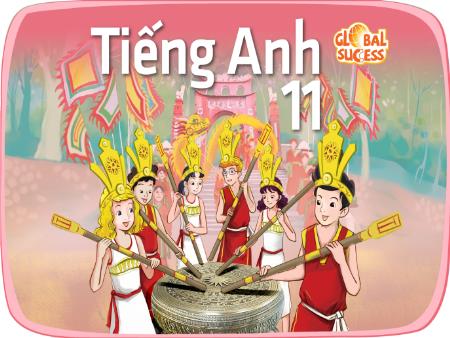Bài giảng Tiếng Anh Lớp 11 (Global Success) - Unit 10: The ecosystem. Lesson 3: Reading
Bạn đang xem 20 trang mẫu của tài liệu "Bài giảng Tiếng Anh Lớp 11 (Global Success) - Unit 10: The ecosystem. Lesson 3: Reading", để tải tài liệu gốc về máy hãy click vào nút Download ở trên.
Tóm tắt nội dung tài liệu: Bài giảng Tiếng Anh Lớp 11 (Global Success) - Unit 10: The ecosystem. Lesson 3: Reading

LESSON 3 READING WARM-UP Quiz PRE-READING Task 1: Discussion • Task 2: Match the headings with WHILE-READING the paragraphs. • Task 3: Complete the sentences. POST-READING Task 4: Discussion • Wrap-up CONSOLIDATION • Homework Question 1 This national park has a favorable geographical position: bordering with Ha Long Bay, near Hai Phong City and others Red River Delta provinces. CAT BA NATIONAL PARK Question 3 This is a national park and UNESCO World Heritage Site. It is approximately 500 km south of Ha Noi or about 1,200 km north of Ho Chi Minh City. PHONG NHA – KE BANG NATIONAL PARK Question 5 The park covers a flat plain that extends from eastern Cambodia into northern Dak Lak and southern Gia Lai provinces in Vietnam. YOK DON NATIONAL PARK PRE-READING 1 Work in pairs. Look at the photos and discuss the questions. + Have you ever been to U Minh Thuong National Park? Where is it? + What did/can you see in the park? PRE-READING mangrove (n) /ˈmổŋɡrəʊv/ a tropical tree that grows in mud or at the edge of rivers and has roots that are above ground PRE-READING pangolin (n) /pổŋˈɡəʊlɪn/ a small animal from Africa or Asia that eats insects, and has a long nose, tongue and tail, and hard scales on its body Form Pronunciation Meaning 1. unique (adj) /juˈniːk/ being the only one of its kind 2. mangrove /ˈmổŋɡrəʊv/ a tropical tree that grows in mud or at the edge of (n) rivers and has roots that are above ground 3. delta (n) /ˈdeltə/ an area of land, like a triangle in shape, where a river has split into several smaller rivers before entering the sea 4. pangolin (n) /pổŋˈɡəʊlɪn/ a small animal from Africa or Asia that eats insects, and has a long nose, tongue and tail, and hard scales on its body 5. floating /ˈfləʊtɪŋ/ staying on or near the surface of a liquid and not (adj) sink WHILE-READING Read the article and match the headings (1-4) with the appropriate 2 paragraph (A-D). 1. Flora and fauna 2. Best time to visit POST-READING 4 Discussion. Why do we need national parks? What should we do to protect them? CONSOLIDATION 2 Homework • Write a short paragraph about how to protect national parks in Viet Nam. • Do exercises in the workbook. • Prepare for Lesson 4 - Unit 10.
File đính kèm:
 bai_giang_tieng_anh_lop_11_global_success_unit_10_the_ecosys.pptx
bai_giang_tieng_anh_lop_11_global_success_unit_10_the_ecosys.pptx

